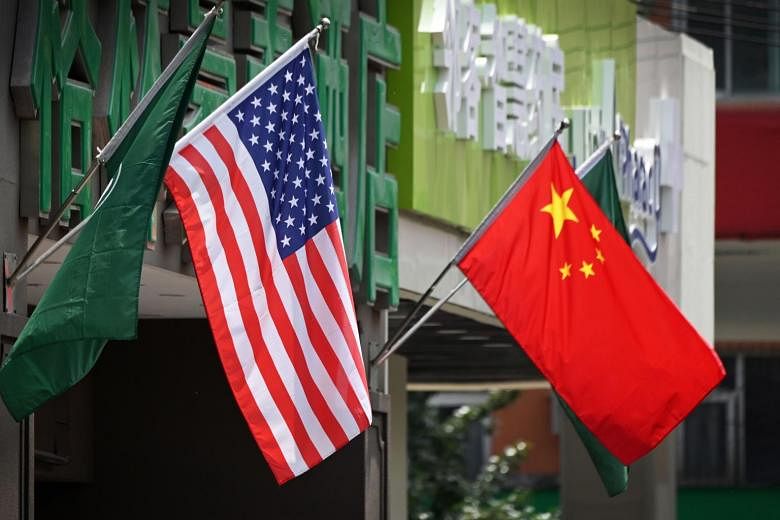Tensions ran high in July between the United States and China, particularly over Hong Kong and the South China Sea.
Summing up the relentless rhythm of sanctions and counter-sanctions, acrimonious accusations and reciprocal words, Chinese Foreign Minister Wang Yi said relations were at their lowest in 40 years, while US President Donald Trump said he had no interest in talking to Beijing about trade.
The relationship is likely to sour even further as the US weighs even stricter bans and sanctions.
The following are the key developments since the beginning of July:
Wednesday, July 1
The US Congress passes the Hong Kong Autonomy Act, which sanctions Chinese individuals and banks responsible for undermining Hong Kong's autonomy, following China's passage of a national security law for the city a day earlier.
China begins five days of military exercises around the South China Sea's Paracel Islands, which Vietnam also claims.
The US Pentagon expresses its concerns in a statement.
Four US agencies warn American companies that they face legal risks and harm to their reputation if they have supply chain links with entities in China guilty of human rights abuses, including the forced labour of Uighur Muslims in Xinjiang.
China orders four US media organisations - the Associated Press, UPI, CBS and National Public Radio - to submit details of their operations in the country as retaliation for the US classifying four major Chinese state media outlets as foreign embassies.
Sunday, July 5
The US deploys two aircraft carriers to the South China Sea as China's own naval exercises in the contested waters are ongoing.
A Navy official describes the mission as a routine operation, but analysts call it a significant show of force.
Tuesday, July 7
Secretary of State Mike Pompeo says the US is considering banning TikTok, a social media app owned by Chinese tech giant ByteDance popular among American teenagers, over personal data security concerns.
Thursday, July 9
Chinese Foreign Minister Wang Yi gives a major speech outlining ways to mend frayed US-China ties, acknowledging that the bilateral relationship is at its lowest since 1979.
He says China has no interest in replacing the US, but accuses US hawks of portraying China as an enemy.
The US sanctions senior Chinese officials over alleged human right abuses of Uighur Muslims in Xinjiang.
Monday, July 13
The US formally rejects most of China's South China Sea claims as unlawful, in a policy shift that backs an international arbitral tribunal's 2016 ruling of the claims as illegal.
Mr Pompeo slams China's "campaign of bullying" South-east Asian nations to gain control of offshore resources.
Beijing condemns the statement as an attempt to sow discord between China and other coastal states in the region.
China imposes retaliatory sanctions on four US politicians, including three Republican Congressmen who are vocal critics of its alleged human rights abuses in Xinjiang, for interfering in its internal affairs.
Tuesday, July 14
President Trump scraps Hong Kong's special status under US law and signs into law the Hong Kong Autonomy Act that will punish Chinese officials responsible for the city's national security law.
The US also begins the suspension of its extradition agreement with Hong Kong. China vows sanctions on American individuals and entities in response.
Britain announces it will ban Chinese tech giant Huawei's equipment from its 5G networks, reversing its initial decision amid American lobbying for European countries to exclude Huawei from their 5G networks due to potential security concerns.
China slams the decision as disappointing.
China announces sanctions on American aerospace and defence manufacturer Lockheed Martin over Washington's recent approval of weapons sales to Taiwan.
Mr Trump says he is not interested in trade talks with Beijing on phase two of their trade deal because of its handling of the coronavirus pandemic, an interview with CBS News.
Wednesday, July 15
The New York Times and Wall Street Journal report that the Trump administration is in early discussions over a travel ban on Communist Party of China members and their families.
The proposed travel ban, if greenlit, could block more than 90 million Chinese nationals from entering the US.
Thursday, July 16
Attorney-General William Barr in a speech slams Disney, Hollywood and other American corporations for "kowtowing" to China, accusing them of censoring themselves on issues sensitive to Beijing in exchange for short-term profits.
American companies will learn the cost of compromise, he says, pointing to how copycat theme parks sprung up in China after Disney opened its park in Shanghai.
Friday, July 17
The US sanctions four Chinese nationals and one company for their roles in trafficking fentanyl, a drug that has played a major role in America's opioid crisis.

